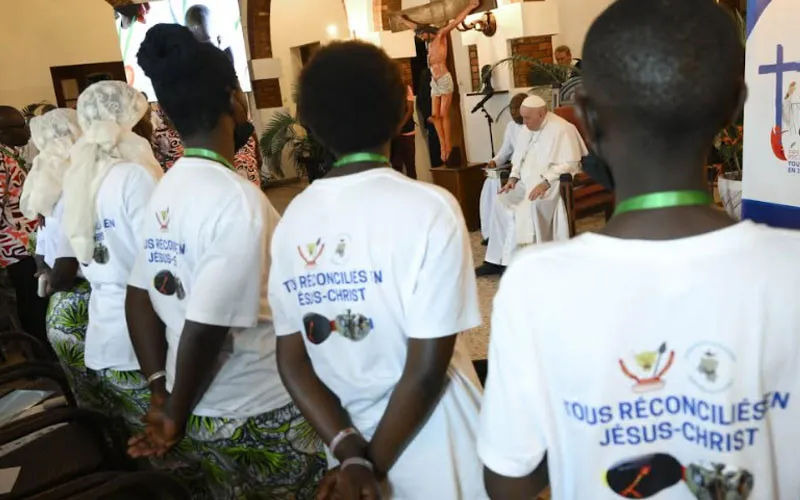
After interacting with Pope Francis on Wednesday, February 1, victims of violence in Ituri Province in Eastern Democratic Republic of Congo (DRC) have expressed hope that peace would return to their country and to their region.
Addressing journalists Thursday, February 2, the Coordinator of the Justice and Peace Commission (CJPC) in Ituri province said they were “greatly touched” by their encounter with Pope Francis.
“We were greatly touched by the Holy Father’s patience during our meeting and we saw a father bearing the suffering of his people,” Fr. Chrizante Djabu who spoke on behalf of victims from Ituri Province during the press conference said.
He added, “The message of consolation received from the Holy Father will touch the hearts of many, even those who could not make it to Kinshasa.”
“We really hope the visit of the Holy Father to our country will touch the hearts of those carryout violence to seek peace,” Fr. Djabu said during the press conference, which members of the Cultural Forum of the Ituri Community of Kinshasa (CIK) organized.
After listening to six testimonies during the February1 meeting, Pope Francis denounced the violent atrocities committed and urged the entire Congolese people to “demilitarize” their hearts.
“In the name of Jesus, who forgave those who pierced his hands and feet with nails, hanging him upon a cross, I ask everyone: Please disarm your heart,” he said.
The Holy Father urged the people of God in DRC to forgive, reminding them that “the cross was itself an instrument of torture and death, the most terrible in use at the time of Jesus, yet, transformed by his love, it has become a universal means of reconciliation, a tree of life.”
Violence in Eastern DRC has created a severe humanitarian crisis with more than 5.5 million people displaced from their homes, the third-highest number of internally displaced people in the world.
More than 120 armed groups are fighting for control of the Eastern Congo, a region rich with natural resources, Reuters reported. In recent months, the M23 rebel group has experienced a resurgence. The U.N. reported that the M23 executed 131 people in November “as part of a campaign of murders, rapes, kidnappings, and looting against two villages.”
Addressing journalists February 2, Fr. Djabu said, “Several civilians are victims of atrocities and thousands of people are displaced as a result of the barbarity of armed fighters.”
He cited the case of Fr. Guy Robert, who had received machete wounds to his head and hands during an attack on his Parish in Fataki, a locality in Ituri Province.
“I would like everyone to be sensitized about peace. I don't want to create a spirit of revenge either,” he said, and added, “In Ituri, there is violence. People are being mutilated and I would like you to feel the extent of what is happening there through the witness that I am.”
He said, “The government should do everything possible to restore its authority in the province.”
“When people take heavy weapons, when groups of people organize themselves and even kill officers of our armed forces, it is not the communities. Only the government can impose peace,” Fr. Djabu said.
Pope Francis concluded the first leg of his two African nation trip Friday, February 3 with a meeting with members of the National Episcopal Conference of Congo (CENCO).
In his address to the Congolese Catholic Bishops, Pope Francis said that during his January 31-February 3 stay in the country, he had experienced the Church in the DRC as “a young, dynamic and joyful Church, motivated by missionary zeal, by the good news that God loves us and that Jesus is Lord.”
“Yours is a Church present in the lived history of this people, deeply rooted in its daily life, and in the forefront of charity,” Pope Francis told CENCO members.
He added, “It is a community capable of attracting others, filled with infectious enthusiasm and therefore, like your forests, with plenty of ‘oxygen.’ Thank you, because you are a lung that helps the universal Church breathe!”
